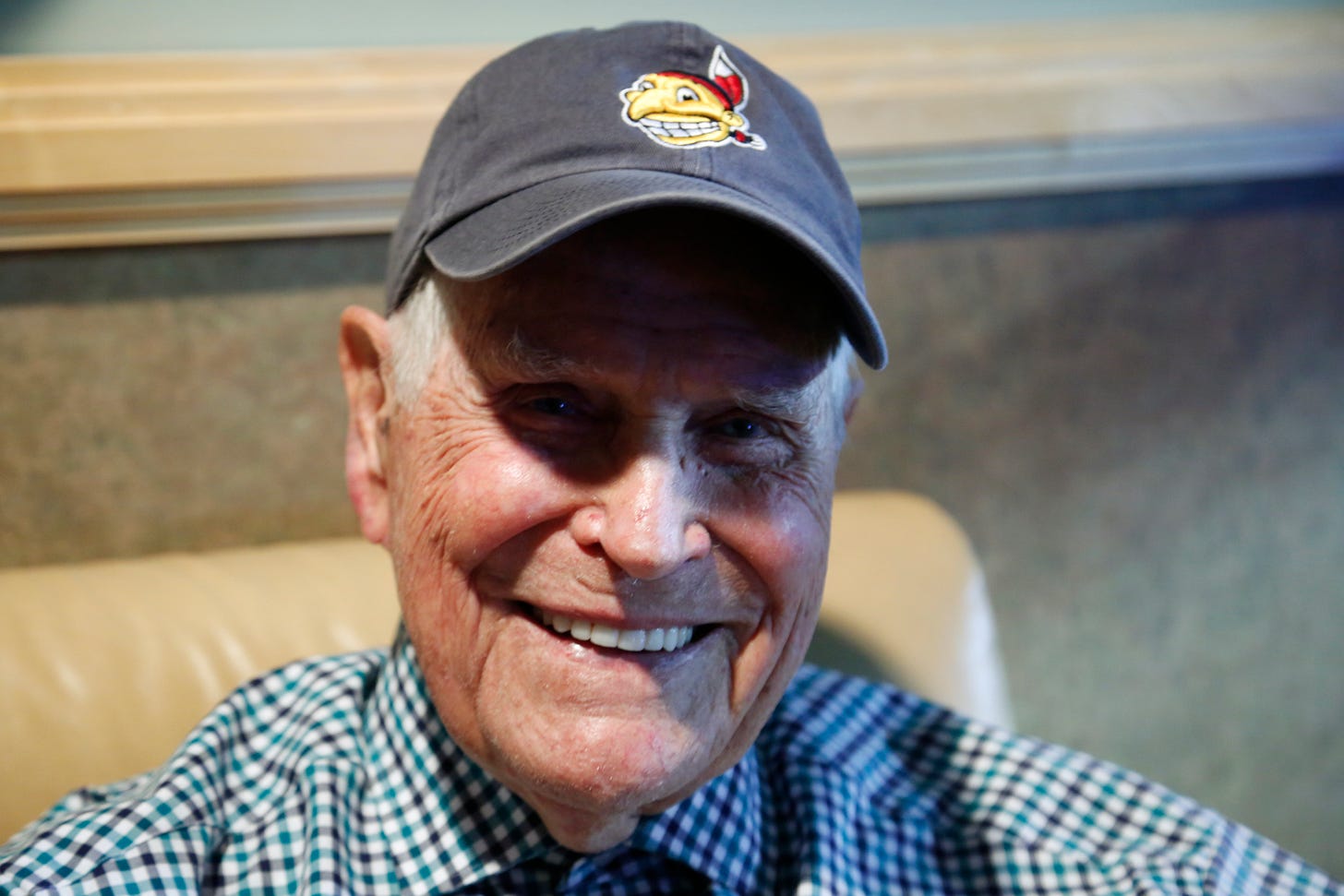Jim Reeves: Former Rangers executive Eddie Robinson was a gracious, compassionate man throughout a remarkable life
Robinson, who died overnight Monday at 100, was baseball's oldest living former player who spent 65 years in the game.

The first time I ever spoke to Eddie Robinson he was bobbing and weaving like a heavyweight boxer.
He did not like my questions because I was putting him in an uncomfortable position. Rangers team owner Brad Corbett, who blabbed more than a Chatty Cathy doll, was responsible for that.
It was mid-September 1976, and I was wrapping up my first full season as one of two Rangers beat writers for the local paper in Fort Worth. The Rangers had just left town on a 10-game, three-city road jaunt to Chicago, Oakland and California. In those days I alternated trips with colleague Bob Lindley, so I was hanging around the office while Bob traveled with the team.
On a whim, I picked up the phone and called Corbett. Rangers beat writers from all the local papers knew that calling Corbett often was an almost a twice-a-day necessity. Like Jerry Jones today, Corbett was likely to blurt out something newsworthy at any given moment.
This time Brad had just told me that he was hiring Robinson, the longtime general manager of the Atlanta Braves, to become GM of the Rangers. Problem was, he had hadn’t told Robinson he was letting the cat out of the bag, so Eddie was dodging this way and that when I called him for a reaction. He wouldn’t confirm anything, but I already had it from the boss’s mouth.
Breaking that story in the afternoon paper may have been my first legitimate “scoop” as a Rangers beat writer. I still remember how sweet it felt to get that first one.
Robinson died Monday night at his ranch in Bastrop a few months shy of his 101st birthday. He was over a century old with over 65 years in baseball as player, executive and scout. More than that, he was a true gentleman with a caring, compassionate heart.
I’m just sorry it took me longer than it should have to fully appreciate that.
I suppose it was natural for Robinson’s relationship with the Texas media to be a bit rocky. He was essentially replacing the popular Dan O’Brien in running the club’s day-to-day operations, though O’Brien, strangely, would retain the GM title while Robinson became executive vice president. We wouldn’t learn until later that O’Brien, who passed in 2017, had pleaded with Corbett and Robinson to keep his title. To save Danny any embarrassment, they agreed. It was a gracious gesture on Robinson’s part, though one never made public.
Robinson was also the punching bag who did his best to stand between Corbett and the media, taking hits that were really aimed at the impulsive Rangers owner. Things wouldn’t get any easier for Eddie when “I’m Mad” Eddie Chiles bought the club from Corbett before the 1981 season.
Robinson’s time in Texas from September 1976 until June 1982 was colorful, to say the least. He was in charge when Lenny Randle assaulted manager Frank Lucchesi. Later that same season, it was Robinson who had the hands-on job of firing Lucchesi in Minnesota, hiring Eddie Stanky and watching him bolt the team after winning one game. In a two-week span, Robinson would preside over four managers (Lucchesi, Stanky, Connie Ryan and Billy Hunter).
Robinson engineered the ill-fated trade of the team’s top two pitching prospects, Ron Darling and Walt Terrell, for outfielder Lee Mazzilli in the spring of 1982. Robinson was also ahead of his time, hiring sabermetrician Craig Wright, one of the first “analytics” specialists in the game.
One of Robinson’s finest moments went virtually unnoticed. When Alison Gordon, the first woman baseball writer in the American League, came to Arlington with Toronto in 1979, Rangers players closed their clubhouse to all media in an effort to keep her out.
When Robinson returned from a trip, he immediately ordered the clubhouse opened, declaring that the ballclub controlled everything in the stadium and that women baseball writers would have the same rights and access as their male counterparts. Bucking the players wasn’t easy in those days, but Eddie never flinched. He knew what was right.
Eddie and I became closer over the years after he worked for the Rangers. He remained in his home in east Fort Worth near Woodhaven Golf Club. We played there together now and then (he always beat me), and I loved sitting down with him in his home office to listen to him talk about his life in baseball. He and Paul Rogers collaborated on Eddie’s biography, Lucky Me, which profiles Robinson’s remarkable time in baseball.
A few years ago when O’Brien died, Eddie called me to ask if I was going to the service in Rockwall, east of Dallas. I said my wife, Karen, and I both planned to go. He asked if we would mind if he and Dr. Bobby Brown rode with us. Karen had worked for Dr. Brown for a year when he was president of the Rangers. We were delighted.
Listening to the two of them, old friends, swap memories and baseball stories for a couple of hours during the round-trip was one of those once-in-a-lifetime magical opportunities.
To borrow Eddie’s line, lucky me.



Thank you for the touching insight into Eddie Robinson. The human element is missed in todays baseball journalism.
I'm a big fan Mr. Reeves, still recall "Radio Free Revo" :).
This is wonderful, thank you so much for sharing this story.